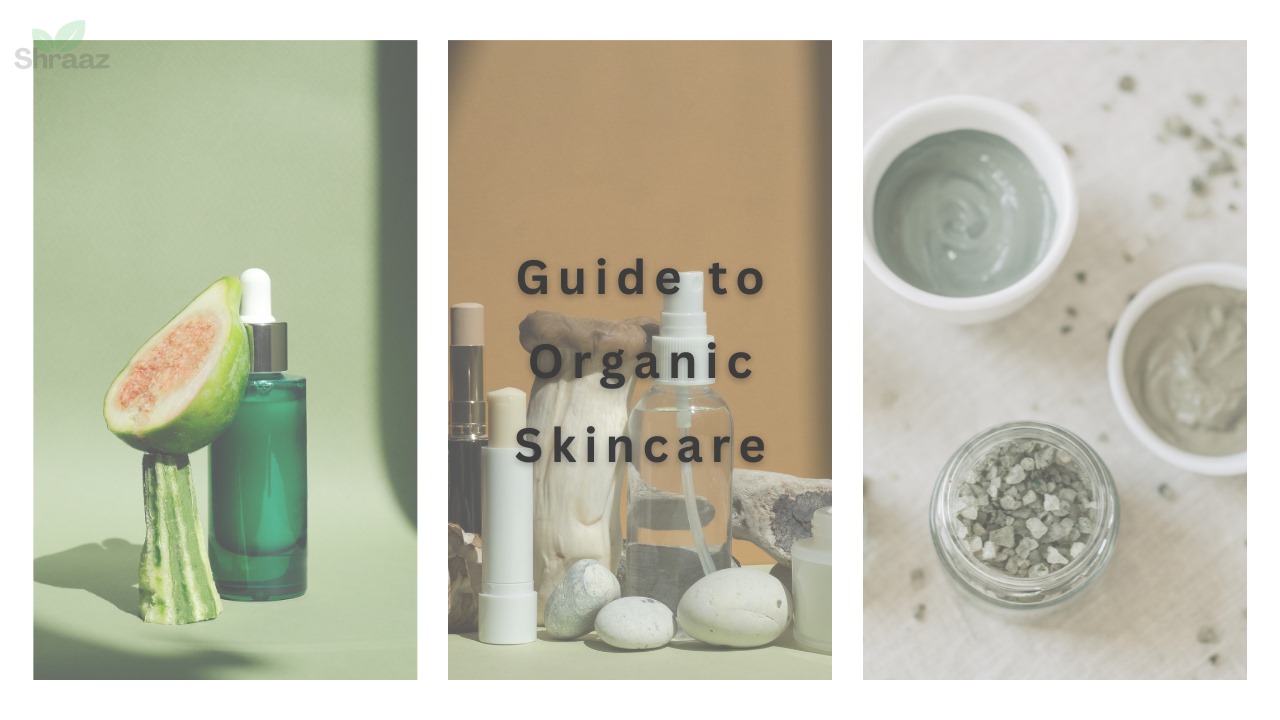Introduction to Organic Skincare
Organic skincare has become one of the most significant trends in the beauty industry, as more people seek natural alternatives to conventional products filled with chemicals. This guide aims to explain what organic skincare really means, its key benefits, and how to effectively integrate organic products into your daily routine. Whether you’re looking to reduce your environmental footprint, find safer ingredients for sensitive skin, or simply nourish your complexion with nature’s best, this guide will help you navigate the world of organic skincare.
For a broader discussion of the overall organic products beyond just skincare, check out The Ultimate Guide to Organic Products: Health, Benefits, and Industry Insights.
What is Organic Skincare?
Organic skincare refers to products made from ingredients that are grown without the use of synthetic chemicals, pesticides, or genetically modified organisms (GMOs). These products are often certified by regulatory bodies that ensure the authenticity of their organic claims, such as USDA Organic or COSMOS Organic. Organic skincare also emphasizes sustainability, cruelty-free practices, and the ethical sourcing of ingredients.
Why Is Organic Skincare Important?
The skin is the body’s largest organ, absorbing many substances that are applied to it. Choosing organic skincare ensures you avoid harmful chemicals and preservatives like parabens, sulfates, and synthetic fragrances, which can cause irritation and long-term damage. Additionally, organic skincare products often contain a higher concentration of active, nutrient-dense ingredients that benefit the skin more effectively than conventional products.
The Growth of Organic Skincare
Organic skincare is rapidly growing. According to a report by Grand View Research, the global organic skincare market was valued at USD 9.83 billion in 2022 and is expected to expand at a compound annual growth rate (CAGR) of 8.9% from 2023 to 2030. This surge is driven by increasing awareness about the potential dangers of synthetic chemicals and a rising preference for sustainable and eco-friendly products.
What Makes Skincare Products Organic?
Understanding what qualifies a skincare product as organic is essential to making informed choices.
Definition of Organic Skincare
Organic skincare refers to products formulated with ingredients that are grown and processed under strict guidelines. These guidelines prohibit the use of pesticides, herbicides, and synthetic fertilizers. Ingredients must be cultivated in environmentally sustainable ways, and the products should contain a significant percentage of organic ingredients (typically 70-95%, depending on the certification).
Organic Certifications
Various organizations certify organic skincare products. Each has its own standards, but most require that a product contains 70-95% organic ingredients. Some of the most recognized certifications include:
- USDA Organic: A U.S.-based certification that requires 95% of a product’s ingredients to be organic.
- COSMOS Organic: A European certification that ensures a product contains at least 95% certified organic ingredients.
- Soil Association: A UK-based certification that verifies organic farming practices and ingredients in cosmetics.
| Certification | Required Organic Percentage | Region |
| USDA Organic | 95% or higher | USA |
| COSMOS Organic | 95% or higher | Europe |
| Soil Association | 95% or higher | UK |
Organic vs. Natural Products
A common misconception is that “natural” equals “organic.” While natural products may use ingredients from nature, they are not necessarily grown organically. Natural products can still contain synthetic additives, while organic products are free from such substances.
Key Differences Between Organic and Non-Organic Skincare
- Synthetic Ingredients: Non-organic products may contain parabens, sulfates, and artificial colors.
- Pesticide Residue: Non-organic ingredients are often treated with pesticides, which may linger in the final product.
- Environmental Impact: Organic farming methods promote sustainability and reduce the carbon footprint, while non-organic practices often harm ecosystems.
Key Benefits of Organic Skincare
Choosing organic skincare products offers numerous benefits for both your skin and the environment.
1. Free from Harmful Chemicals
Organic skincare products are formulated without synthetic chemicals, preservatives, and artificial fragrances that can harm your skin and overall health. For example, common skincare chemicals like parabens (preservatives) and sulfates (cleansers) can disrupt hormone balance and irritate the skin. Organic alternatives avoid these harmful additives, focusing instead on plant-based, nourishing ingredients.
2. Skin Health and Better Absorption
Since organic skincare uses natural ingredients such as essential oils, plant extracts, and natural butters, the skin absorbs them more effectively. These ingredients are packed with antioxidants, vitamins, and minerals that promote skin health. Products with chemicals, on the other hand, can act as barriers, preventing proper nutrient absorption.
3. Environmentally Friendly
Organic farming practices used to grow ingredients in organic skincare products are more environmentally sustainable. These practices conserve water, protect soil fertility, and reduce pollution by avoiding synthetic pesticides and fertilizers.
4. Fewer Allergic Reactions and Irritation
For people with sensitive skin, organic products are often a better choice. Since they contain fewer synthetic ingredients, they are less likely to cause skin irritation, allergic reactions, or other adverse effects.
5. Cruelty-Free and Ethically Sourced
Most organic skincare brands prioritize cruelty-free testing and ethically sourced ingredients. They avoid animal testing and ensure that their supply chain supports fair trade practices, contributing positively to local farming communities.
Statistics on Organic Skincare’s Popularity
- A 2021 report by Transparency Market Research revealed that 63% of consumers believe natural ingredients are better for their skin.
- In a survey by Statista, 45% of respondents indicated that they specifically sought out organic skincare products due to concerns about chemical exposure.
Popular Ingredients in Organic Skincare
Organic skincare relies on natural ingredients derived from plants, herbs, and minerals. Here are some of the most popular and effective ingredients:
1. Plant-Based Oils
- Argan Oil: Rich in vitamin E and fatty acids, argan oil deeply moisturizes and improves elasticity.
- Jojoba Oil: A natural emollient, jojoba oil mimics the skin’s sebum, balancing oil production and hydrating the skin.
- Rosehip Oil: High in antioxidants and essential fatty acids, it promotes skin regeneration and reduces the appearance of scars and fine lines.
2. Botanical Extracts
- Aloe Vera: Known for its healing and soothing properties, aloe vera is ideal for calming irritated skin and promoting hydration.
- Green Tea Extract: Packed with antioxidants, green tea extract helps protect the skin from environmental damage and premature aging.
3. Essential Oils
- Lavender Oil: This essential oil is known for its calming properties, lavender oil is great for sensitive or acne-prone skin.
- Tea Tree Oil: A powerful natural antiseptic, tea tree oil is effective against acne and skin blemishes.
4. Natural Butters
- Shea Butter: An ultra-nourishing ingredient that deeply moisturizes the skin and helps in repairing dry, cracked skin.
- Cocoa Butter: Known for its ability to improve skin elasticity, cocoa butter is often used in anti-aging and stretch mark products.
5. Clays and Powders
- Bentonite Clay: This highly absorbent clay is perfect for detoxifying and deep-cleaning pores, especially for oily skin.
- Kaolin Clay: A gentler option, kaolin clay helps to gently exfoliate and cleanse without stripping the skin’s natural oils.
These ingredients form the backbone of many organic skin care products, offering natural and effective solutions to various skin concerns without synthetic additives.
Organic Skincare Routines
Incorporating organic skincare products into a consistent and balanced routine is essential to maximizing their benefits.
1. Morning Routine
Start the day by cleansing, toning, and moisturizing with organic products:
- Cleanser: A gentle organic cleanser removes any oil or dirt accumulated overnight.
- Toner: An organic toner, such as rose water or witch hazel, helps balance the skin’s pH.
- Moisturizer: Apply a light, organic moisturizer or oil such as jojoba or argan oil.
- SPF: Protect your skin from UV rays with an organic sunscreen that uses non-nano zinc oxide for sun protection.
2. Evening Routine
In the evening, the focus should be on removing makeup, cleansing thoroughly, and repairing the skin:
- Double Cleanse: Start with an oil-based organic cleanser to remove makeup and sunscreen, followed by a gentle foaming cleanser.
- Serums and Treatments: Use organic serums that target specific concerns like fine lines or acne. Serums with hyaluronic acid or vitamin C can be highly effective.
- Night Cream: Finish with a rich, organic night cream that repairs and hydrates while you sleep.
3. Weekly Rituals
Incorporating weekly treatments can boost your skincare routine:
- Exfoliation: Organic exfoliants with natural grains (such as apricot seeds or sugar) slough off dead skin cells, promoting a brighter complexion.
- Masks: Organic masks with clays or antioxidant-rich botanicals like matcha or turmeric can detoxify and nourish the skin.
Organic Skincare for Different Skin Concerns
Organic skincare products are highly versatile and can address various skin concerns naturally and effectively, also very versatile with different age groups. Here’s how you can tackle common skin issues using organic ingredients and products.
1. Anti-Aging
Aging is a natural process, but organic skin care can help slow down the visible signs of aging like fine lines, wrinkles, and loss of elasticity. Several organic ingredients are packed with antioxidants and nutrients that promote collagen production and skin regeneration:
- Vitamin C: Known for its brightening and anti-aging properties, vitamin C helps to fade dark spots, even out skin tone, and promote collagen synthesis.
- Hyaluronic Acid: Derived from plants like wheat or sugarcane, hyaluronic acid hydrates the skin, giving it a plump and youthful appearance.
- Resveratrol: Found in organic grapes, this powerful antioxidant protects against free radicals that contribute to aging.
2. Acne and Blemishes
Organic skincare can be an effective solution for acne-prone skin without the use of harsh chemicals that may irritate or dry out the skin. Organic anti-acne products focus on balancing sebum production and treating inflammation:
- Tea Tree Oil: Known for its natural antibacterial properties, tea tree oil can reduce acne-causing bacteria and calm redness.
- Witch Hazel: An astringent derived from the witch hazel plant, it helps to tighten pores and reduce inflammation.
- Aloe Vera: Soothes irritation and accelerates healing, making it ideal for reducing acne scars and calming active breakouts.
3. Hyperpigmentation
Dark spots and uneven skin tone are common concerns for many. Organic ingredients rich in antioxidants and natural brighteners can gradually lighten hyperpigmentation and improve overall skin radiance:
- Licorice Root: Naturally inhibits melanin production, making it effective in fading dark spots.
- Turmeric: A well-known anti-inflammatory and brightening agent, turmeric helps reduce pigmentation and even out skin tone.
- Rosehip Oil: High in vitamin A, rosehip oil promotes skin regeneration and helps fade scars and dark spots over time.
4. Sensitive Skin and Eczema
Organic skincare is ideal for sensitive or eczema-prone skin because it avoids synthetic fragrances, dyes, and harsh chemicals that often trigger irritation. Gentle, soothing ingredients help reduce inflammation and moisturize the skin:
- Calendula: Known for its healing and anti-inflammatory properties, calendula is excellent for reducing irritation and redness.
- Oat Extract: A common ingredient in organic skincare for sensitive skin, oats soothe and protect the skin barrier.
- Chamomile: Helps to calm irritated skin and is particularly useful for those with eczema or rosacea.
How to Choose the Right Organic Skincare Products
Navigating the world of organic skincare can be overwhelming, especially with the increasing number of products available. Here’s a guide to help you choose the best organic products for your skin’s needs.
1. Reading Labels and Certifications
One of the most important steps when selecting organic skincare products is to read the labels carefully. Look for the following:
- Certified Organic Labels: As mentioned earlier, look for reputable certifications like USDA Organic, COSMOS Organic, or the Soil Association.
- Ingredient List: Ingredients are listed in order of concentration, so the first five ingredients are the most crucial. If a product claims to be organic but has synthetic fillers high on the list, it may not be genuinely organic.
- Avoid Greenwashing: Some brands use terms like “natural” or “eco-friendly” without adhering to organic standards. Check for certified claims to avoid falling for marketing tricks.
2. Patch Testing for Allergies
Even organic products can cause reactions, especially if they contain potent essential oils or botanicals. It’s important to:
- Test New Products: Apply a small amount of the product on your wrist or behind your ear and wait 24-48 hours to check for any irritation or allergic reaction.
- Monitor Reactions: Look for signs of redness, itching, or discomfort before using the product on your face.
3. Adapting Your Routine to the Seasons
Your skin’s needs change with the seasons, and so should your skincare routine:
- Winter: Opt for heavier, more emollient organic moisturizers like shea butter and oils like argan or avocado to prevent dryness.
- Summer: Lighter, non-comedogenic oils like jojoba, and gel-based moisturizers with aloe vera or cucumber are ideal for the warmer months.
4. Product Longevity and Storage
Organic skincare products often contain fewer preservatives, making them more sensitive to environmental factors. To maintain their efficacy:
- Store in a Cool, Dry Place: Keep products away from direct sunlight or heat to prevent oxidation and degradation of active ingredients.
- Check Expiry Dates: Organic products have a shorter shelf life, so always check the expiration dates and use them within the recommended period.
DIY Organic Skincare
Creating your own organic skincare products can be a fun, cost-effective way to ensure you’re using fresh, pure ingredients. Here are some simple DIY recipes using natural, organic ingredients.
1. Benefits of DIY Organic Skincare
- Control Over Ingredients: You know exactly what’s going into your products, ensuring no harmful chemicals or allergens.
- Cost-Effective: DIY skincare is often more affordable than store-bought organic products.
- Freshness: Homemade products are made fresh, without the need for preservatives, which can sometimes degrade over time in commercial products.
2. Simple DIY Organic Skincare Recipes
Cleansers
- Honey and Oat Cleanser: Mix organic raw honey with finely ground organic oats for a gentle, moisturizing cleanser that exfoliates and hydrates the skin.
Masks
- Avocado and Yogurt Mask: Mash half an organic avocado and mix it with a tablespoon of organic yogurt. This nourishing mask is rich in antioxidants and probiotics to hydrate and brighten your skin.
Scrubs
- Sugar and Olive Oil Scrub: Combine one tablespoon of organic sugar with a tablespoon of organic olive oil to create a simple, exfoliating body scrub. Use it once a week for smooth, glowing skin.
Moisturizers
- Shea Butter and Almond Oil Balm: Melt organic shea butter and mix with organic almond oil for a deeply moisturizing body balm. Store in a jar and use after bathing.
These DIY recipes allow you to tailor skincare to your specific needs using pure, natural ingredients, and they’re easy to integrate into any routine.
Organic Skincare Myths vs. Facts
As organic skincare gains popularity, misconceptions about its effectiveness and cost continue to circulate. Let’s debunk some common myths.
1. Myth: Organic Skincare is Too Expensive
- Fact: While some organic products may be priced higher due to their premium ingredients and sustainable practices, they can also be cost-effective in the long term. Additionally, DIY organic skincare offers an affordable alternative.
2. Myth: Organic Products Don’t Work as Well as Conventional Ones
- Fact: Many organic products are packed with high concentrations of active ingredients like antioxidants and essential oils. Studies have shown that ingredients such as vitamin C and rosehip oil can significantly improve skin tone and texture, demonstrating that organic products can be just as effective as their conventional counterparts.
3. Myth: All Natural Ingredients are Safe
- Fact: Not all natural ingredients are suitable for everyone. For example, essential oils like cinnamon or peppermint can be irritating to sensitive skin. Always perform patch tests before using new products.
4. Myth: Organic Skincare Has a Shorter Shelf Life
- Fact: While it’s true that organic products may have a shorter shelf life due to fewer preservatives, proper storage (cool, dry places) can help extend their usability. Moreover, many organic products contain natural preservatives like vitamin E or rosemary extract, which help maintain freshness.
Organic Skincare for Men
The organic skincare movement isn’t just for women. Men, too, can benefit from using products made with natural ingredients that are gentle on the skin and eco-friendly, and the trend for men’s grooming is growing rapidly.
1. Why Organic Skincare Matters for Men
Men’s skin is different from women’s—generally thicker and oilier—and it faces different challenges, like irritation from shaving. Organic skincare products designed for men can address these unique needs without harsh chemicals that might lead to irritation or dryness.
2. Recommended Organic Products for Men
- Aftershaves: Organic aftershaves with aloe vera, witch hazel, and chamomile help soothe post-shave irritation without alcohol or synthetic fragrances.
- Beard Oils: Organic beard oils made from jojoba and argan oil can condition facial hair while nourishing the skin underneath.
- Moisturizers: Organic, lightweight moisturizers like those with aloe vera and green tea extract are great for hydrating without clogging pores.
3. Common Skin Concerns for Men
- Acne: Men’s oilier skin may lead to more frequent breakouts. Organic products containing tea tree oil or activated charcoal can help cleanse pores and prevent breakouts.
- Razor Bumps: Natural astringents like witch hazel reduce inflammation and prevent ingrown hairs caused by shaving.
Organic Skincare and Sustainability
One of the key reasons people opt for organic skincare is the environmental benefits it offers. Organic skincare aligns with sustainability in several important ways:
1. Reducing Environmental Impact
Organic farming practices avoid the use of harmful pesticides and chemicals that contribute to soil degradation, water pollution, and loss of biodiversity. Additionally, many organic skincare brands use eco-friendly packaging materials like recycled cardboard or glass, reducing plastic waste.
2. Supporting Ethical Sourcing and Fair Trade
Many organic skincare brands are committed to sourcing ingredients ethically. This means ensuring that the ingredients are harvested in a way that protects both the environment and the rights of workers involved in their production.
3. Lowering Carbon Footprint
By promoting local sourcing and minimizing energy-intensive processes like synthetic chemical production, organic skincare companies are often able to lower their carbon footprint. Consumers who choose these brands contribute to a smaller environmental impact overall.
Top Organic Skincare Brands to Know
With so many brands claiming to be organic, it can be difficult to identify the best ones. Here are some top organic skincare brands that consistently offer high-quality, certified organic products:
| Brand | Certifications | Specialty |
| Tata Harper | COSMOS Organic | High-performance luxury skincare |
| Juice Beauty | USDA Organic | Antioxidant-rich skincare |
| Dr. Hauschka | NATRUE Certified | Holistic and natural formulations |
| Pai Skincare | Soil Association | Sensitive skin solutions |
| True Botanicals | MADE SAFE Certified | Anti-aging skincare |
These brands have built strong reputations for offering truly organic products, using sustainably sourced ingredients, and adhering to eco-friendly practices.
Conclusion
Organic skincare is more than just a trend—it’s a lifestyle choice that benefits both your skin and the planet. By choosing products free from harmful chemicals and made from ethically sourced ingredients, you’re not only caring for your skin but also supporting sustainability and wellness. Organic skincare products provide effective, natural solutions for every skin type and concern, helping you achieve healthier, more radiant skin.
FAQ Section
Q1: Are organic skincare products better for sensitive skin?
Yes, organic products are often gentler because they lack synthetic chemicals that can irritate sensitive skin. Look for organic products specifically designed for sensitive skin, such as those with calming ingredients like aloe vera and chamomile.
Q2: How long does it take to see results from organic skincare?
Results vary depending on the product and your skin type, but generally, you may start to see improvements within 4 to 6 weeks of consistent use. Patience is key, as organic products work to nourish and repair the skin naturally.
Q3: Can I use organic skincare products during pregnancy?
Many organic products are safe for use during pregnancy, but it’s always best to check with your doctor. Avoid essential oils like rosemary or clary sage, which are not recommended during pregnancy.
Q4: Is it necessary to switch my entire routine to organic products?
Not necessarily. You can gradually incorporate organic products into your skincare routine. Start with a cleanser or moisturizer and see how your skin responds before making a complete switch.
Q5: Do organic skincare products expire faster?
Yes, due to the absence of synthetic preservatives, organic skincare products often have a shorter shelf life. Make sure to check expiration dates and store products properly in cool, dry places.




